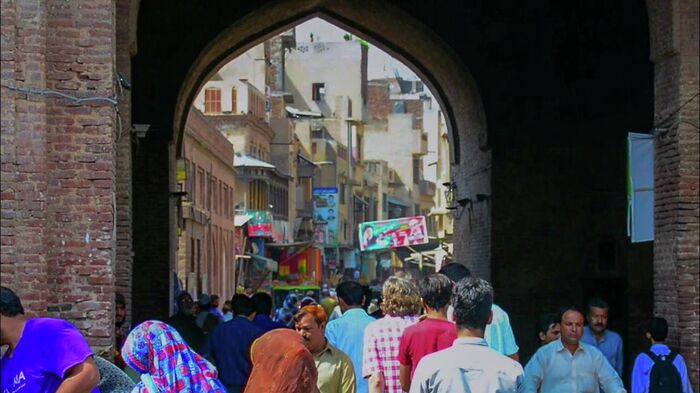The lost tongue: Rediscovering Urdu in Cambridge
Our columnist Khadija Tahir explores her complex relationship with English and Urdu, alongside the historical and social associations of each language

Language has dominated my life since I can remember, as it probably does for most people. It isn’t merely a means of communication, of getting your ideas across and a tool to share opinions; for me, it was the foundational basis of a community. My Pakistani identity, which constantly went through conflicts and various contradictions, wasn’t bound solely by my mother tongue, Urdu, but also English.
From school curriculums to street signs, Pakistani society has openly embraced a language that was once imposed on them, and invalidated, not only their power to communicate and express, but also their native literature, culture and academia. English, seen to be more of a weapon than a language in the colony, has now become an integral part of the post-partition generations. The importance of being fluent and polished in a language that is no longer even considered foreign, is stressed repeatedly. My teachers preferred an ‘international’ accent, which I was forced to develop, and my peers automatically associated English with intellectual superiority, and used it repeatedly to stress points and arguments, these were instances that I dismissed as being completely normal. Having no regard for Urdu, barely using it in my daily life, and having no knowledge of the art such a language produced was an outlook most shared.
“I failed to acknowledge the beauties of Pakistan, specifically Lahore, and the language that carries the pain, the violence, the recovery, the development and the constant struggle the country has faced.”
In the past, language was used to divide and rule the diverse communities in the colony, and this pattern repeats itself in modern Pakistan. Feeling less comfortable in my own language, I built barriers between me and those who still retain their native tongue. In other words, I distanced myself from my own country, despite having been born and raised there. I was handed Dickens’ novels before being able to read Mumtaz Mufti’s short stories, and I was reading Plath before Ghalib. I had created playlists filled with American and British music and had completely lost track of the up and coming Urdu artists. I felt nothing towards Pakistan except for this deeply-embedded desire to leave it. Blinded by visions of the American Dream and the supposed ‘cultural superiority’ of Europe, I failed to acknowledge the beauties of Pakistan, specifically Lahore, and the language that carries the pain, the violence, the recovery, the development and the constant struggle the country has faced. I dismissed my country completely by partially, and at times, completely abandoning Urdu.
“During Michaelmas, I was less home-sick and more language-sick”
September 2018 was the when I was told to focus on one language that would ‘open doors for me’ and ‘guarantee me success’, rather than half-heartedly juggling two languages. Coming to Cambridge I did not expect to grow closer to something I had undermined for the past eighteen years. During Michaelmas, I was less home-sick and more language-sick. I found it odd not hearing the occasional Urdu word uttered by my friends, or the speedy Urdu instructions given to little kids on the street. I remember looking at the Urdu newspaper alongside the English ones in the morning, the latter which only my father read. It took only 18 years and about 5000 miles of distance from Pakistan, for me to acknowledge the importance of my mother-tongue. I opened up different websites, and spent time every week just reading simple prose, trying to read the curvature of the letters fluently enough to form words rather than syllables. It began as embarrassing. I was not able to read simple words such as غرور (gharoor, worried). It was tempting to go back to dismissing the Urdu, and returning to the comfortable English language, having always spoken, read, and listened to it, through the various mediums it was available to me in. But I also knew that any further distance would be a loss of my ‘Pakistani-ness’, which I wasn’t willing to lose in a country I wasn’t comfortable calling ‘home’ yet. So I persevered.
“Where I went wrong, and most Pakistanis unfortunately still do, is neglect the importance of our native tongue”
After 3 months, I, through improving my Urdu reading, was exposed to the subversive literature of writers narrating their experiences in both colonial and post-colonial Pakistan. I had read اولاد(Aulaad, Children), one of the first stories by Pakistani short story writer Saadat Hassan Manto, which focused on the unrealistic, yet straining pressures faced by women all over the world, to bear children and satisfy everyone but themselves. This dark commentary on South Asian society aligned with opinions and criticisms I held. Despite enjoying Saki and other such writers growing up, it wasn’t until I had read اولاد that I had held up a mirror to my own self and my own society, furthering my grasp on the social structures and the impact they had on women who didn’t have the privilege of escaping to institutions such as Cambridge.
In my time at Cambridge, I began to appreciate the beauty of both Urdu and English, and the honour of being able to have access to both. Despite the complicated relationship of Pakistan with English, it is difficult to dismiss a language which exerts immense influence on a global platform. Where I went wrong, and most Pakistanis unfortunately still do, is neglect the importance of our native tongue, a language which carries with it the painful past of such a beloved country. Urdu is an acceptance of our colonial past, and a rebuilding of the culture such a past blurred. It is about regaining whatever was taken away from us and using the language as a bridge to close the gap we have established as a nation, between our own country and us.
 News / Colleges charge different rents for the same Castle Street accommodation2 March 2026
News / Colleges charge different rents for the same Castle Street accommodation2 March 2026 News / King’s hosts open iftar for Ramadan3 March 2026
News / King’s hosts open iftar for Ramadan3 March 2026 Theatre / Lunatics and leisure centres 4 March 2026
Theatre / Lunatics and leisure centres 4 March 2026 News / Angela Merkel among Cambridge honorary degree nominees27 February 2026
News / Angela Merkel among Cambridge honorary degree nominees27 February 2026 News / News in Brief: waterworks, wine woes, and workplace wins 1 March 2026
News / News in Brief: waterworks, wine woes, and workplace wins 1 March 2026









